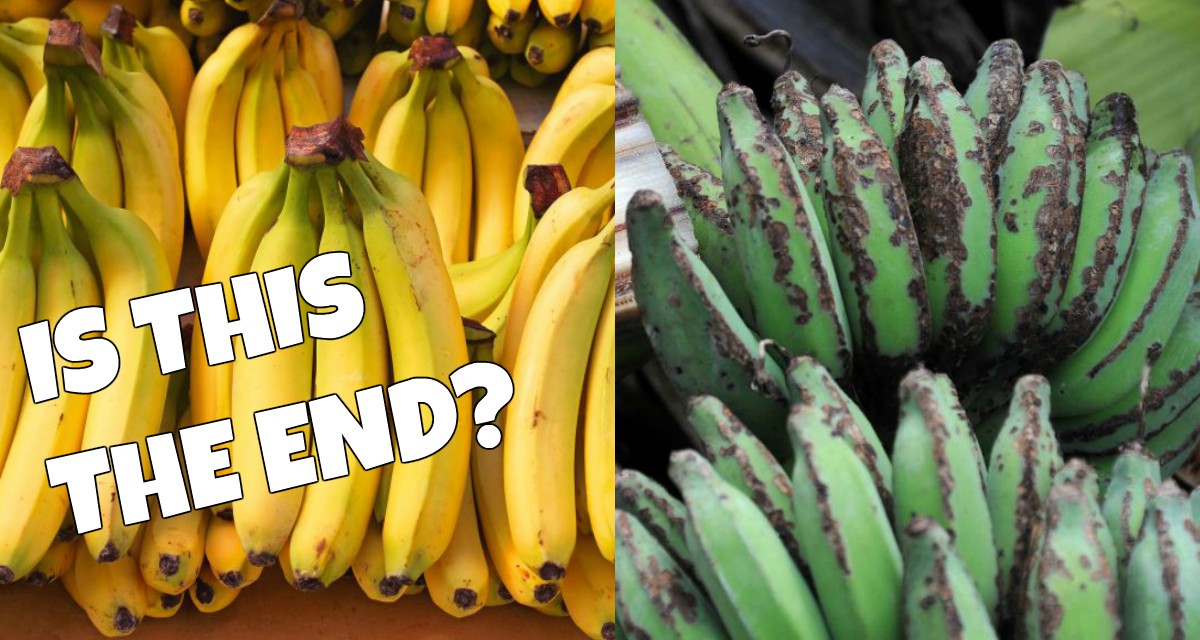Bad News: Your Favorite Fruit Is On The Verge Extinction
Science explains the ongoing demise of America's most popular fruit.

Bananas Are On the Verge of Extinction (Again)
You don't have to be a Despicable Me Minion to love bananas. It's our favorite fruit — too bad its days are numbered.
Scientists have been warning us for years about a deadly fungus that has the potential to wipe out the banana we hold so dear. It's called tropical race 4 (TR4) and it's already attacked crops all over the world.
Also known as the "Panama disease," TR4 is immune to any kind of fungicide. They attack a type of banana called the Cavendish banana, which is likely the only kind of banana you've ever consumed. This type of banana is especially susceptible to the fungus because they are genetically identical. So if one banana tree cannot resist the fungus, neither can the rest of them.
That means that the entire species can be completely wiped out. This is especially bad news for us, because Cavendish bananas make up 95 percent of the global banana trade.

Don't Believe Us? It's Happened Before.
We can trace the origin of this crisis back to the 1960s, when the same fungal plague nearly drove another banana called the Gros Michel to extinction. Up until then, the Gros Michel was the dominant variety on the market (it's probably what your grandparents grew up eating). It was later replaced by the Cavendish banana because it tasted similar and was thought to be able to resist the deadly Panama disease.
As you still see so many bananas in the produce aisle, you may be a bit skeptical. That's because America hasn't felt the brunt of it — yet. Most of our bananas come from Latin America. The fungus has already hit parts of Asia and Africa pretty hard. If it hits the banana plantations in Central America, the results could be devastating.

Is There Hope?
We've seen what happens when a major crop gets wiped out. Consider the Irish potato famine, caused by a disease that killed entire crops and led over a million people to starve.
While the banana isn't considered as high a priority for scientists as corn or wheat, it still plays an important role in the global economy and diet. Scientists are currently working to genetically engineer a banana that will be resistant to TR4. GMOs may be the best way to mitigate this growing threat to food security.
Meanwhile, we'll lie in wait and hope that this time around, Mother Nature is on our side.
What do you think about the fate of bananas? Comment to let us know!
If you enjoyed this article, you may be interested in reading about the rising price of avocados.
More steaming articles
 14 amazing ways to make chocolate chip...
14 amazing ways to make chocolate chip...
 Parents can't stop sharing this...
Parents can't stop sharing this...
 How your toothpaste can tell you if you...
How your toothpaste can tell you if you...
Chef Tips and Tricks
Craving sweet? This rustic cherry tart is easy, quick and delicious!
INGREDIENTS:
- 1 shortcrust pastry
- 3 cups / 750 g. of cherries
- 1/3 cup / 60 g. of sugar
- 2/3 cup / 60 g. of almond flour
- 4 tbsp. of brown sugar
- Pistachios
- A dash of milk
METHOD:
- Mix the cherries and sugar together. Let stand 20 minutes.
- Spread or roll out the shortcrust pastry, sprinkle with almond powder and brown sugar.
- Place the cherries in the center of the dough, leaving about 2 inches of free dough on the edges. Fold in the edges.
- Brush with milk (this will make the crust go golden), sprinkle with brown sugar and bake for 20 minutes at 350°F/180°C.
- Top with a handful of chopped pistachios, and serve!


Comment on this article